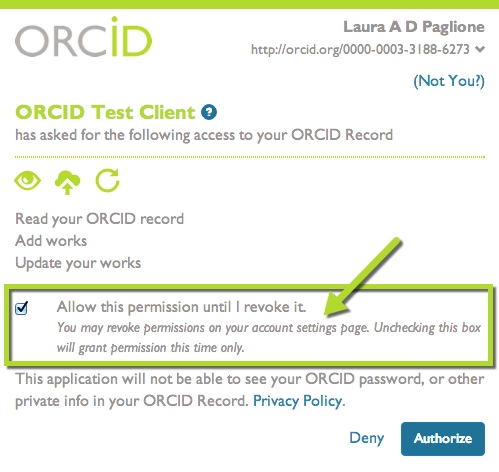Today we continue our New Functionality Friday series where we focusing on highly-requested items from our iDeas Forum. Thanks again for providing so many great ideas!
This post includes the fourth end-of-the-year goody that we recently released: Auto update of your ORCID record. This functionality was requested in at least five different iDeas submitted to us, and has been the topic of many conversations at our outreach meetings and elsewhere.
ORCID record auto update

Updating an ORCID record automatically requires two pieces: 1) providing our member organizations the ability to request long-lasting access permission from ORCID record holders, and 2) members implementing applications and workflows to update ORCID record information.
I said it was okay; stop asking me!
The ORCID registry lets researchers decide who can access their ORCID record and how. Until recently, an application had to ask your permission each time you connected it to your ORCID Record. ORCID now supports long-lasting permissions, which allows you to grant access for a single transaction or until you revoke permission to the application. This means that information–manuscripts, grants, datasets, your thesis– for which you have included your ORCID iD during the submission process, can flow into your record upon publication.
It takes two to tango
ORCID member organizations are as excited about enabling their systems and applications for auto update as ORCID iD holders are about having their ORCID record updated without further intervention. Some members already have implemented the long-lasting permissions, and many more are getting ready to provide automatic updates. Working with researchers and our members, by enabling long-lasting permissions, ORCID aims to make it easier for researchers to keep their information current and reduce “profile fatigue”, which will be warmly welcomed by all!
Here is a highlight of a few popular sites that are implementing auto-updates:
CrossRef – Published journal articles are assigned unique digital identifiers (DOIs) to enable and assure continued online availability. Publishers send article information to CrossRef, who then issue a DOI. ORCID iDs are part of the information sent to CrossRef. Researchers can already manually search CrossRef to link their ORCID iD to past works. For those papers that include ORCID iDs, CrossRef is planning an application to push publication information to ORCID records, saving researchers a step to maintain their ORCID record, and all the systems that update based on record data.
Europe PMC – This resource indexes articles, grants, patents, clinical guidelines, and other biomedical research information. Like CrossRef, researchers can manually search EuropePMC to link their ORCID iD to past works. EuropePMC will be enabling autoupdate of ORCID records for new information indexed that includes an ORCID identifier.
Proquest – Pivot has enabled users to import and export information between their platform and ORCID. Pivot will soon enable auto-updating of their scholar profiles via ORCID long-lasting permissions, to solve the oft-cited problem of researchers having to maintain their research activity record.
Thomson Reuters – ResearcherID, ScholarOne, and Converis have integrated ORCID iDs, and are planning auto-update enhancements.
ScienceOpen – In this post-publication peer review platform containing nearly 1.4 M articles from PubMed Central arXive and others, researchers are given the opportunity to create an ORCID iD at registration. Review privileges are offered to experts with five publications or more linked to their ORCID iD. ScienceOpen will be rolling out functionality to enable automatic additions of new articles (both mirrored and published by ScienceOpen) and/or updates of ORCID records.
UberResearch – This organization maintains an international database of grants and projects. Researchers may use the UberWizard to link past and existing funded awards to their ORCID record, and UberResearch are planning functionality to push new funding information to ORCID for researcher who have granted long-lasting permissions.
